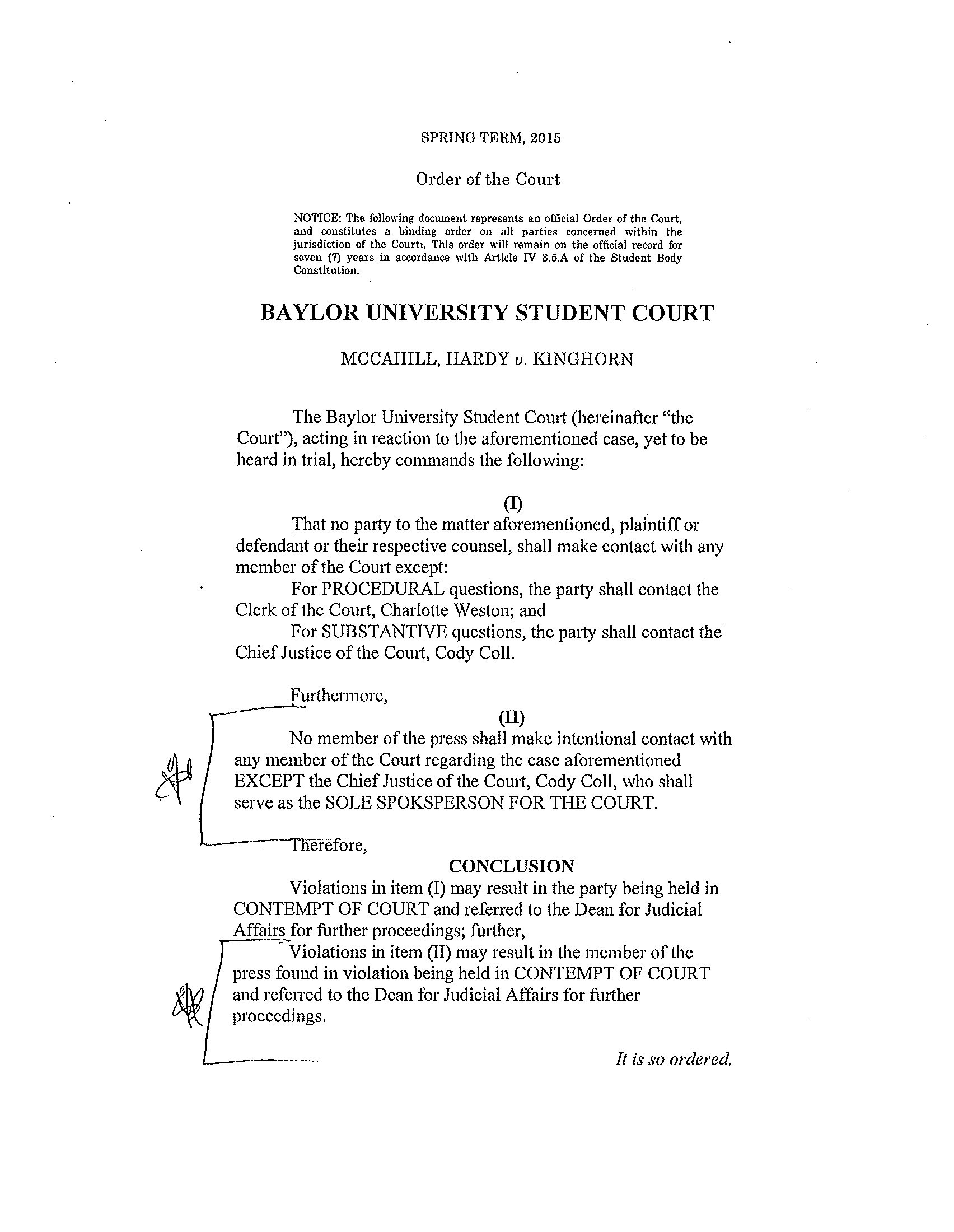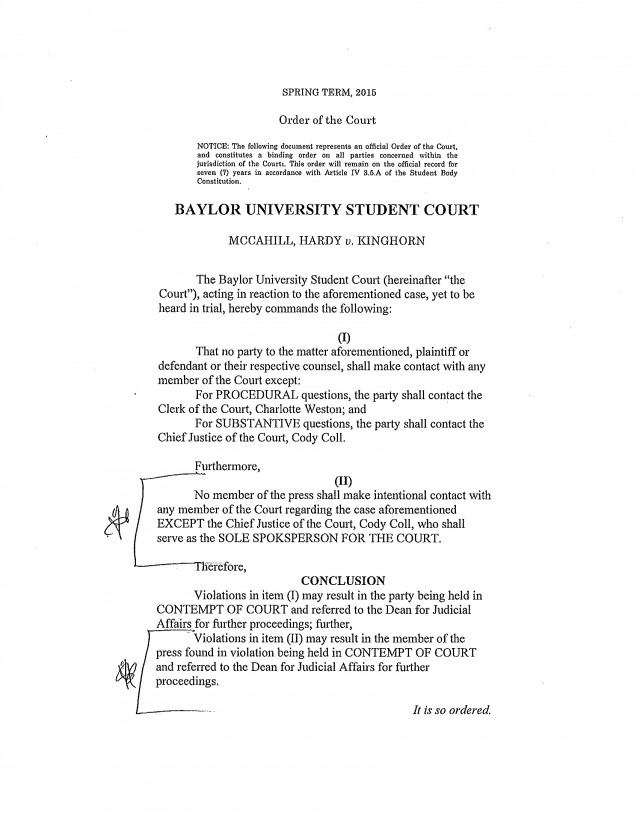

By Reubin Turner
City Desk Editor
In what began as another internal dispute in the university’s Student Senate has risen a case that could test the limits of student government authority regarding First Amendment rights campuswide.
This disagreement between the Baylor Lariat and Student Court, the judicial branch of student government, arose after the court issued a no-contact order this past Thursday to parties in McCahill, Hardy v. Kinghorn, a pending case on the court’s docket, and the Lariat.
The order was then updated and sent to Lariat editor-in-chief, Tyrone, Ga., senior Linda Wilkins on Monday. Houston junior Cody Coll, chief justice of Student Court, said the purpose of amending the wording was to clarify that the court had jurisdiction over Lariat employees.
The case involves two student senators who are suing Katy junior Lawren Kinghorn for failing to uphold her duties as internal vice president, as previously reported by the Lariat.
Coll said the order was necessary and proper in the court’s effort to protect the integrity of the pending case. Coll, in fact, has even gone on record as saying the order was issued to protect the Lariat.
“This case has a magnitude beyond anything that we’ve dealt with,” Coll said.
Coll said in the event the case was declared a mistrial, the Lariat could be held liable if the court had reason to believe the Lariat introduced bias into the case.
Adam Goldstein, attorney advocate for the Student Press Law Center, said in his 11 years of working with the SPLC, he has never before seen a case where the student press was issued a no contact order by a student court.
“It’s so completely beyond the scope of authority delegated to this institution,” Goldstein said in a phone interview with the Lariat. Goldstein said because the Lariat was not a party in the case, the court had no authority to issue the publication an order.
Goldstein said he does not see how the order can protect the Lariat since the student newspaper isn’t in any danger. Despite the fact consequences are listed in the order for violations, Goldstein also said he saw no true value in the document, citing jurisdictional issues as being the chief reason.
“How does an order issued to a non-party protect a non-party?” Goldstein said in response to Coll’s claim that the order was meant to protect the Lariat. Goldstein also said it was somewhat hard to address the order because of its nature.
“This [order] is not even wrong. Two plus two equals five is wrong, but two plus two equals chicken is not even wrong. And this is an example is not even wrong,” Goldstein said.
According to the document, “No member of the press shall make intentional contact with any member of the Court regarding the case aforementioned EXCEPT the Chief Justice of the Court, Cody Coll, who shall serve as the SOLE SPOKSPERSON [sic] FOR THE COURT.” All seven justices on the court voted to issue the order.
The document states violations of the order could result in recipients being found in contempt of court, which would lead to being referred to the dean of judicial affairs for further action.
Other than believing the order to be necessary to keep the case unbiased, Coll said the order was well within their jurisdiction since employees of the Lariat were students, and fell under policies outlined in the student body constitution.
“Our jurisdiction in this case is self-evident as outlined by the student body constitution,” Coll said, citing Article III of the document.
The student publication remains unconvinced, however, that the order was necessary and Wilkins said the order could set a “dangerous precedent,” stating that the case had national implications as well, with regard to the First Amendment and rights of the press.
Wilkins also said contrary to Coll’s beliefs, the order places a restriction on the press’s ability to report because it places limitations on who it can contact.
“I was confused that we received the order in the first place, considering we are not parties of the case,” she said.
Wilkins said, it would have been much more practical for Coll to inform his justices to direct all questions from the press to him. “This is more of an internal issue,” Wilkins said. Coll said while he did instruct his justices to direct all questions to him, he and his justices felt a no-contact order was necessary as well.
The SPLC viewing the case as simple does not undermine the fact that the parties see strikingly different views on the reach of the court as well as the intent of the order.
“This does not stop the Lariat from doing their job,” Coll said. Coll said the order was not a gag order, which places a restriction on information being made public, and it did not restrict the Lariat’s ability to print. Coll said that the Lariat could still contact him for questions regarding the case, but not justices or clerks of the court.
Coll also said that while this is the first time he has issued a no contact order, this move is not unprecedented in the history of the court.
After a search through Lariat archives, the Lariat could find no proof that the press had ever been issued a no-contact order by the court.
The Lariat contacted York Springs, Pa., junior William Stover and Waco junior Joshua Conatser, both associate justices for the court, about cases in the past where no-contact orders were issued.
Both justices declined to comment.





